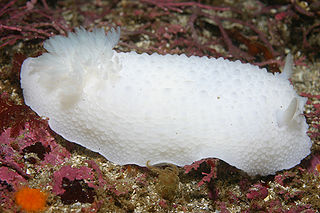
Doridoidea, commonly known as dorid nudibranchs, are a taxonomic superfamily of medium to large, shell-less sea slugs, marine gastropod mollusks in the clade Doridacea, included in the clade Nudibranchia.

The Polyceridae are a taxonomic family of sea slugs, dorid nudibranchs, marine gastropod mollusks within the superfamily Polyceroidea.

Chromodorididae, or chromodorids, are a taxonomic family of colourful, sea slugs; dorid nudibranchs, marine gastropod mollusks in the superfamily Doridoidea. “Chromodorid nudibranchs are among the most gorgeously coloured of all animals.” The over 360 described species are primarily found in tropical and subtropical waters, as members of coral reef communities, specifically associated with their sponge prey. The chromodorids are the most speciose family of opisthobranchs. They range in size from <10mm to over 30 cm, although most species are approximately 15–30 mm in size.

Aldisa is a genus of sea slugs, dorid nudibranchs, marine gastropod molluscs in the family Cadlinidae.
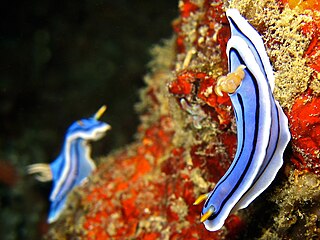
Chromodoris is a genus of very colourful sea slugs or dorid nudibranchs, marine gastropod molluscs, and the type genus of the family Chromodorididae. Within the genus Chromodoris, there are currently 101 classified species. Species within Chromodoris are commonly found in tropical and subtropical waters, living as members of reef communities and preying primarily on sponges. A molecular phylogeny of the family Chromodorididae resulted in this genus being restricted to a smaller number of species than formerly, most of which have longitudinal black lines on the mantle. Many former members of Chromodoris were transferred to Goniobranchus
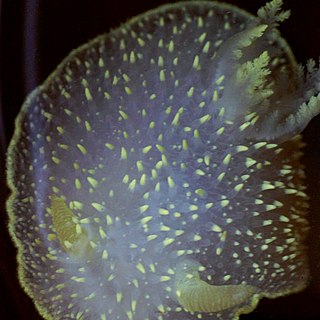
Acanthodoris is a genus of sea slugs, dorid nudibranchs, shell-less marine gastropod mollusks in the family Onchidorididae. The genus is believed to have originated in the Atlantic Ocean in the Cretaceous period and spread to the Pacific Ocean. The relationships of Acanthodoris to the other genera in the family Onchidorididae were evaluated by molecular phylogeny in 2015.

Glossodoris is a genus of sea slugs, dorid nudibranchs, shell-less marine gastropod mollusks in the family Chromodorididae.

Halgerda is a genus of sea slugs, dorid nudibranchs, shell-less marine gastropod mollusks in the family Discodorididae.

Doris is a genus of sea slugs, specifically dorid nudibranchs. These animals are marine gastropod molluscs in the family Dorididae.
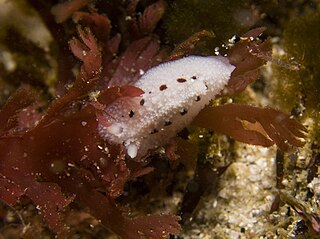
Atagema is a genus of sea slugs, specifically dorid nudibranchs. They are marine gastropod molluscs in the family Discodorididae.
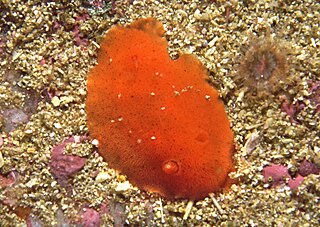
Discodorididae is a taxonomic family of sea slugs, specifically dorid nudibranchs, marine gastropod mollusks in the superfamily Doridoidea.
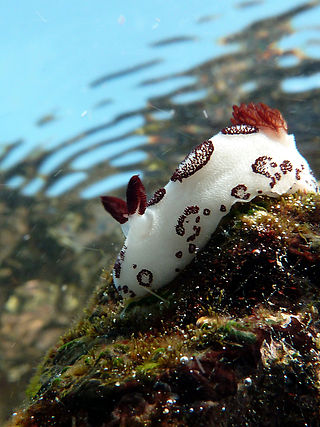
Jorunna is a genus of sea slugs, dorid nudibranchs, shell-less marine gastropod molluscs in the family Discodorididae.

Actinocyclidae is a family of sea slugs, dorid nudibranchs, marine gastropod mollusks in the superfamily Doridoidea. This family is within the clade Euctenidiacea.

Discodoris is a genus of sea slugs, dorid nudibranchs, shell-less marine gastropod molluscs in the family Discodorididae.
Otinodoris is a genus of sea slugs, dorid nudibranchs, shell-less marine gastropod mollusks previously placed in the family Chromodorididae. It is now considered a synonym of Asteronotus Ehrenberg, 1831 and placed in the family Discodorididae
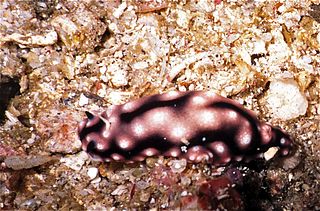
Paradoris is a genus of sea slugs, dorid nudibranchs, shell-less marine gastropod mollusks in the family Discodorididae.

Platydoris is a genus of sea slugs, dorid nudibranchs, shell-less marine gastropod mollusks in the family Discodorididae. These nudibranchs are large and often brightly coloured, but normally live concealed beneath rocks or loose coral, feeding on sponges. During the night they become more active, searching for new food sources or mates. Many species were described in the 19th century and a revision in 2002 added six new species.

Thordisa is a genus of sea slugs, dorid nudibranchs, shell-less marine gastropod mollusks in the family Discodorididae.

Alloiodoris is a genus of sea slugs, specifically dorid nudibranchs. They are marine gastropod molluscs in the family Discodorididae. Alloiodoris species are found in the Southern Hemisphere, in South Africa, Australia and New Zealand.

Miamira is a genus of colourful sea slugs, specifically dorid nudibranchs, shell-less marine gastropod mollusks in the family Chromodorididae.

















